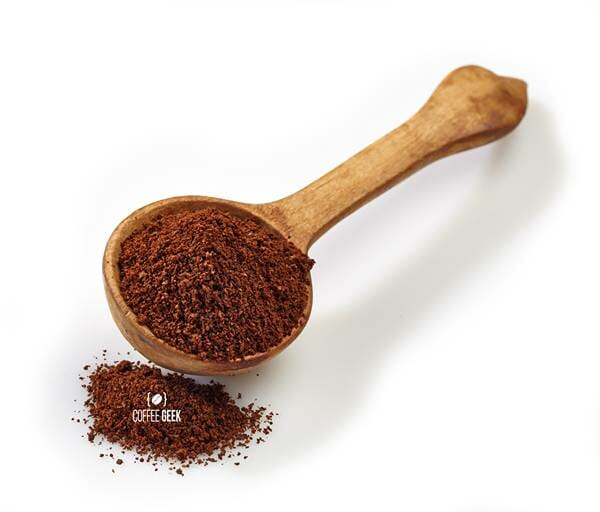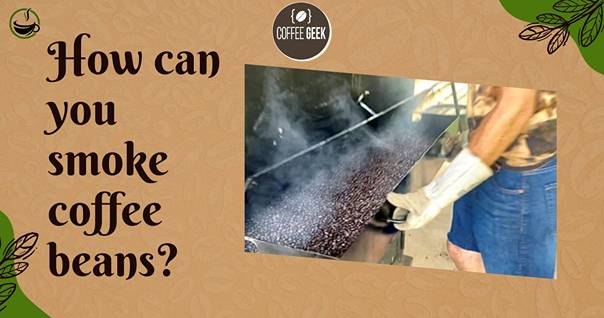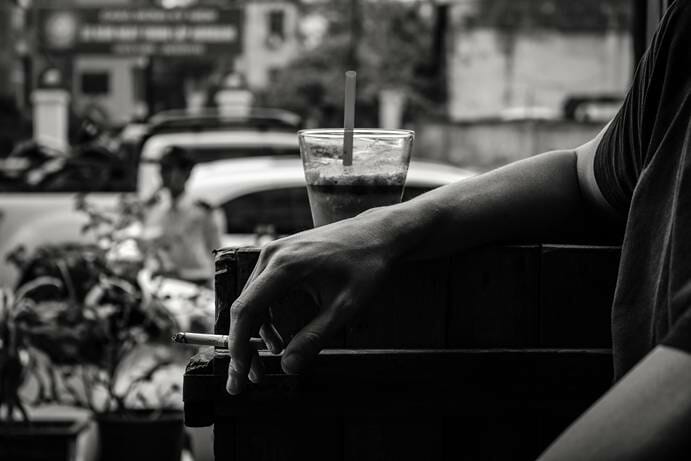Coffee, a staple in many morning routines, has usually been enjoyed in its traditional beverage form.
However, a new trend has emerged where people are experimenting with smoking coffee grounds instead.
This peculiar habit has sparked conversations about smoking coffee poses its effects, side effects, and potential health risks.
While this trend may be intriguing, it’s important to consider the potential consequences.
Can you smoke coffee?
You can smoke coffee grounds, but it may lead to lightheadedness and health concerns, especially respiratory issues. Traditional coffee consumption is safer and recommended.
Furthermore, health professionals have raised concerns about the impact of this trend on the respiratory system.

As more coffee lovers and enthusiasts consider delving into this unconventional method, one should be aware of potential health risks, the variety of woods used for smoking coffee, and compare its effects to other substances.
While it’s natural to be curious about new ways to consume coffee, it’s essential to prioritize personal well-being.
Key Takeaways
- Smoking coffee grounds has become a trend, causing a head rush or lightheadedness in some cases.
- Health professionals have expressed concerns regarding the potential respiratory issues associated with smoking coffee.
- Be aware of the different smoking woods, the effects of smoking coffee compared to other substances, and prioritize your well-being when experimenting with new coffee consumption methods.
Can You Smoke Coffee
Smoking Coffee Grounds
Yes, it is possible to smoke coffee grounds, but it’s not going to give you the traditional coffee experience.
Smoking coffee grounds reportedly causes a head rush or lightheadedness in some people1.
In higher amounts, a few coffee smokers have reported symptoms like trouble sleeping, jitters, and increased energy2.
However, these side effects vary based on the amount of coffee and the method used to smoke3.

It is essential to be cautious when experimenting with smoking grounds due to the potential risks involved, such as convulsions, diarrhea, dizziness, hallucinations, vomiting, and fevers4.
In any case, it is not recommended to mix coffee grounds with tobacco, as it could trigger adverse reactions.
Smoking Coffee Beans
When it comes to smoking coffee beans, you should only smoke green coffee beans 5.
You can cold-smoke green coffee beans on a smoker, which will typically take around two hours to complete.
It is helpful to stir the coffee every now and then to ensure that it smokes evenly throughout6.
Just like coffee grounds smoking, smoking coffee beans also carries certain risks, so be cautious and aware of the potential side effects when trying it out7.

Remember, smoking coffee is not the conventional way to consume coffee, and the side effects and risks that come with it might outweigh the adventure.
It is crucial to always stay informed and cautious when getting involved in experimental trends.
Effects and Side Effects
Caffeine Buzz and Head Rush
When you smoke coffee, you might experience an increased energy since coffee contains caffeine.
This can lead to an intense head rush, characterized by lightheadedness or dizziness.
However, it’s important to keep in mind that these effects may not be pleasant and can lead to anxiety or jitters.
Smoking coffee can also cause the onset of nausea, especially when combined with the dizziness experienced during the head rush.
Negative Health Effects
There are several negative health effects associated with smoking coffee.
Firstly, the caffeine you inhale may cause trouble sleeping and these sleep issues can accumulate over time, adversely affecting your daytime alertness and overall performance.
Additionally, smoking coffee can lead to an overdose of caffeine, which can cause serious side effects such as convulsions, diarrhea, hallucinations, vomiting, fevers, and more.
In some cases, these symptoms may also be accompanied by heartburn or other digestive issues.
When you smoke coffee, you’re also inhaling compounds like tar and carbon monoxide which can be harmful to your health.
These compounds increase the risk of health problems associated with smoking, such as respiratory infections or even lung diseases.
To minimize the negative health effects of caffeine, it’s advised to stick with consuming coffee in a moderate, traditional manner.
Enjoying a daily consumption of 2-5 cups brewed coffee may provide health benefits such as a lower likelihood of type 2 diabetes, heart disease, and other conditions, while avoiding the unwanted side effects that could come from smoking it.
Health Risks of Smoking Coffee
Respiratory and Lung Diseases
When you smoke coffee, you’re inhaling particulates that can cause respiratory irritation and increase the risk of lung diseases. According to the American Cancer Society, inhaling any kind of smoke can be harmful to your lungs and respiratory system.
By smoking coffee, you’re potentially exposing yourself to similar risks.
Cardiovascular Diseases and Cancer
While moderate coffee consumption is known to have some cardiovascular benefits, smoking the grounds might have the opposite effect.
The chemicals and particulates found in coffee smoke could potentially contribute to cardiovascular diseases and increase the risk of cancer.
It’s essential to remember that these risks are associated with coffee smoking, not with typical consumption as a beverage.
Caffeine Overdose
As you might expect, coffee smoking delivers caffeine to your system, but the absorption rate consume caffeine could be unpredictable.
Ingesting too much caffeine in a short period can lead to caffeine overdose, which includes symptoms like trouble sleeping, jitters, increased energy, and even more severe health problems.
It’s much safer and more enjoyable to stick with drinking your coffee to avoid the potential dangers of caffeine overdose.
Alternative Ways to Use Coffee
Drinking Coffee for Health Benefits
You might be surprised to learn that drinking coffee offers several health benefits.
Regularly consuming a moderate amount of coffee can help improve your cognitive function, protect against various diseases, and even support your metabolism.
Additionally, coffee provides antioxidants that are essential for keeping your body healthy and strong.
When it comes to customizing your coffee experience, choosing the right beans can make all the difference.
Experiment with different types of coffee beans and brewing methods to find the perfect flavor profile that suits your taste buds. Remember, moderation is key.
While drinking coffee has its benefits, consuming too much caffeine can lead to negative side effects.
Coffee Smoking Wood for Unique Flavors
Apart from drinking, another way to use coffee is by using coffee smoking wood to infuse a distinct flavor into your food.
This method involves smoking meats, vegetables, or other foods using wood chips soaked in coffee, which imparts a unique flavor profile to your dishes.
To get started, simply soak your desired wood chips in a mixture of coffee and water for at least an hour.
Drain the chips and spread them evenly over the charcoal or smoking chambers of your grill or smoker.
As the wood heats up, it releases a rich, smoky aroma that permeates your food.
By experimenting with different types of wood and coffee beans, you can customize the flavors to your personal preferences.
The combination of coffee and smoking wood opens up a world of possibilities for your culinary adventures.
So next time you’re preparing a meal, consider using coffee as a creative way to upgrade your cooking experience.
Coffee Smoking Woods

Alder
Alder is a versatile smoking wood that you can use when smoking coffee beans.
It imparts a mild, smoky flavor to your coffee, making it an ideal choice for those who enjoy subtle hints of smokiness.
Alder wood is often used alongside fruit woods to achieve a well-balanced smoky profile in your coffee.
Mesquite
Mesquite is another option to consider for smoking your coffee bean. Its bold, earthy flavor comes through more prominently than that of alder.
However, some people may perceive mesquite’s strong flavor as having a harsh, burnt taste. It can be an excellent choice for those who prefer a more assertive smoky characteristic in their coffee.
Cherry Wood
Cherry wood is a popular choice for smoking coffee beans due to its sweet and fruity flavor profile.
It can add a unique and pleasant twist to your coffee, especially when used with beans that have naturally fruity characteristics, such as Ethiopian or Kenyan blonde roasts.
Combining cherry wood with other fruit woods can result in an even more distinct flavor.
Airtight Containers for Storage
After smoking your own coffee beans, it’s essential to store them in an airtight container. This helps to keep the beans fresh and preserve their unique smoky flavors.
Choose a container made of a material that will not absorb odors, such as glass or stainless steel.
Keep your container in a cool, dark place to ensure the beans maintain their optimal taste and aroma.
Comparing Smoking Coffee to Other Substances
Tobacco
When it comes to coffee smoking, it’s quite different from smoking tobacco. Tobacco contains nicotine and is known to be addictive, while coffee does not have such addictive properties.
However, coffee smoking has been reported to cause lightheadedness or dizziness in some cases.
Tobacco smoke contains harmful substances such as tar, carbon monoxide, and many other toxic chemicals.
Inhaling these substances can lead to an increased risk of diseases and respiratory issues like coughing and headaches.
Herbal Cigarettes
Herbal cigarettes are another alternative to tobacco cigarettes. These cigarettes are made from various herbs or plants and do not contain nicotine.
However, smoking anything, including herbal cigarettes, still carries some risk to your respiratory system.
Comparatively, smoking coffee is not well-studied, and its long-term effects on health are uncertain.
While herbal cigarettes can also produce tar and carbon monoxide, they are generally considered a healthier alternative to traditional tobacco cigarettes.
e-Cigarettes
e-Cigarettes, also known as vapes, have gained popularity as a potentially healthier alternative to smoking tobacco.
With e-cigarettes, a liquid (usually containing nicotine) is heated into vapor, offering a less harmful way to consume nicotine without many of the toxic chemicals found in tobacco smoke.
Some people have attempted to vape coffee grounds, but there are reports of users feeling unwell afterwards.
Additionally, this form of consumption still exposes your body to caffeine, so it’s essential to be cautious about using this method.
Nicotine and Addiction
One significant distinction between coffee smoking and other substances is the absence of nicotine.
Nicotine is a highly addictive substance found in tobacco and e-cigarettes, and it is responsible for the cravings and withdrawal symptoms many smokers experience when trying to quit smoking.
Smoking coffee does not have the same addiction potential, but it is still not advisable to use ground coffee as a medium for smoking, given its likely undesirable side effects.

Frequently Asked Questions
Is smoking coffee harmful?
Coffee smoking can be harmful, as it may cause side effects such as lightheadedness or dizziness when mixed with tobacco1. Caffeine overdose triggered by smoking can lead to convulsions, diarrhea, hallucinations, vomiting, and more2. It’s better to consume coffee in its intended form—brewed as a beverage.
What happens when you smoke coffee-soaked paper?
When you smoke or inhale coffee-soaked paper, your lungs might absorb the chemicals found in coffee3. This could result in a faster, but not necessarily stronger, caffeine buzz4. However, it is not a recommended practice due to the potential health risks associated with inhaling paper and coffee chemicals.
What are some smoked coffee drinks?
Currently, smoked coffee drinks aren’t common due to the potential risks and side effects associated with coffee smoking. It is advisable to stick to traditional coffee beverages or explore alternative ways to achieve a smoky flavor, such as using naturally smoked coffee beans.
Is it possible to smoke instant coffee?
Although technically possible, smoking instant coffee is not recommended due to the potential health risks mentioned earlier. Instead, enjoy instant coffee by mixing it with hot water, as intended.
How do you cold-smoke coffee beans?
Cold-smoking coffee beans isn’t a typical practice, but if you wish to experiment, use a cold smoker setup that doesn’t heat the beans during the smoking process. This may allow you to infuse the beans with a smoky flavor without roasting them.




